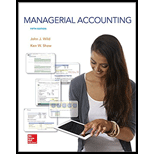
Fixed Cost:
Fixed cost is the cost that remains the same or constant throughout a particular period and does not vary over time. For example, Rent paid for a building, administration fees.
Variable Cost:
Variable cost is that cost that varies over a period of time depending upon the quantity produced. For example, raw material and labor.
Direct cost:
Direct costs are the cost that are directly associated or related with the production and manufacturing activities of a business. For example,
Indirect Cost:
Indirect costs are the costs that are not directly associated with production activities of a business such as advertisements.
To Classify: Each cost as fixed or variable and direct or indirect cost.
Want to see the full answer?
Check out a sample textbook solution
Chapter 1 Solutions
MANAGERIAL ACCOUNTING FUND. W/CONNECT
- Can you explain this financial accounting question using accurate calculation methods?arrow_forwardComet Industries reported FIFO ending inventory of $138,200 and a beginning inventory of $130,600 for 2023. Inventory purchases for 2023 were $278,500, and the change in the LIFO reserve for 2023 was an increase in the LIFO reserve of $1,050. Calculate the value of COGS under LIFO for Comet Industries in 2023.arrow_forwardWhat is the primary purpose of the trial balance?A) To prepare financial statementsB) To detect errors in journal entriesC) To ensure debits equal creditsD) To calculate net incomestep by steparrow_forward
- I am looking for help with this financial accounting question using proper accounting standards.arrow_forwardPlease give me true answer this financial accounting questionarrow_forwardWhich principle dictates that expenses should be recognized in the same period as the revenues they help to generate?A) Revenue Recognition PrincipleB) Matching PrincipleC) Conservatism PrincipleD) Cost Principlearrow_forward
- Please provide the correct answer to this financial accounting problem using accurate calculations.arrow_forwardI am searching for the accurate solution to this financial accounting problem with the right approach.arrow_forwardWhat is the primary purpose of the trial balance?A) To prepare financial statementsB) To detect errors in journal entriesC) To ensure debits equal creditsD) To calculate net income need help!arrow_forward
- Can you solve this financial accounting problem with appropriate steps and explanations?arrow_forwardPlease provide the correct answer to this general accounting problem using valid calculations.arrow_forwardWhat is the primary purpose of the trial balance?A) To prepare financial statementsB) To detect errors in journal entriesC) To ensure debits equal creditsD) To calculate net incomearrow_forward

 AccountingAccountingISBN:9781337272094Author:WARREN, Carl S., Reeve, James M., Duchac, Jonathan E.Publisher:Cengage Learning,
AccountingAccountingISBN:9781337272094Author:WARREN, Carl S., Reeve, James M., Duchac, Jonathan E.Publisher:Cengage Learning, Accounting Information SystemsAccountingISBN:9781337619202Author:Hall, James A.Publisher:Cengage Learning,
Accounting Information SystemsAccountingISBN:9781337619202Author:Hall, James A.Publisher:Cengage Learning, Horngren's Cost Accounting: A Managerial Emphasis...AccountingISBN:9780134475585Author:Srikant M. Datar, Madhav V. RajanPublisher:PEARSON
Horngren's Cost Accounting: A Managerial Emphasis...AccountingISBN:9780134475585Author:Srikant M. Datar, Madhav V. RajanPublisher:PEARSON Intermediate AccountingAccountingISBN:9781259722660Author:J. David Spiceland, Mark W. Nelson, Wayne M ThomasPublisher:McGraw-Hill Education
Intermediate AccountingAccountingISBN:9781259722660Author:J. David Spiceland, Mark W. Nelson, Wayne M ThomasPublisher:McGraw-Hill Education Financial and Managerial AccountingAccountingISBN:9781259726705Author:John J Wild, Ken W. Shaw, Barbara Chiappetta Fundamental Accounting PrinciplesPublisher:McGraw-Hill Education
Financial and Managerial AccountingAccountingISBN:9781259726705Author:John J Wild, Ken W. Shaw, Barbara Chiappetta Fundamental Accounting PrinciplesPublisher:McGraw-Hill Education





